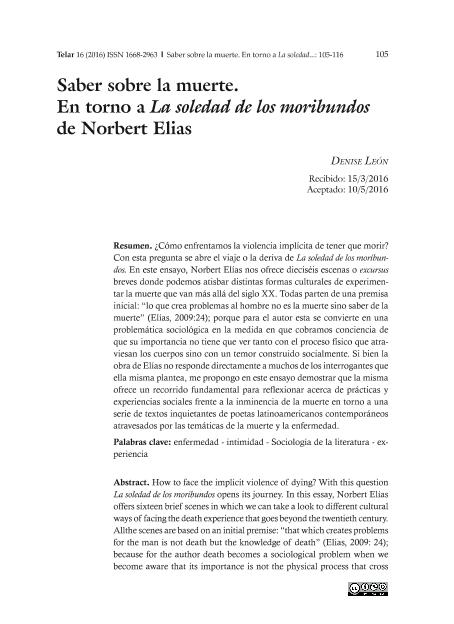Mostrar el registro sencillo del ítem
dc.contributor.author
León, Denise

dc.date.available
2017-12-12T19:13:39Z
dc.date.issued
2016-07
dc.identifier.citation
León, Denise; Notas a la soledad de los moribundos de Norbert Elías; Universidad Nacional de Tucuman. Facultad de Filosofía y Letras; Revista Telar; 16; 7-2016; 105-116
dc.identifier.issn
1668-3633
dc.identifier.uri
http://hdl.handle.net/11336/30330
dc.description.abstract
¿Cómo enfrentamos la violencia implícita de tener que morir? Con esta pregunta se abre el viaje o la deriva de La soledad de los moribundos. En este ensayo, Norbert Elías nos ofrece dieciséis escenas o excursus breves donde podemos atisbar distintas formas culturales de experimentar la muerte que van mas allá del siglo XX. Todas parten de una premisa inicial: “lo que crea problemas al hombre no es la muerte sino saber de la muerte” (Elías, 2009:24); porque para el autor la muerte se convierte en una problemática sociológica en la medida en que cobramos conciencia de que su importancia no tiene que ver tanto con el proceso físico que atraviesan los cuerpos sino con un temor construido socialmente. Si bien la obra de Elías no responde directamente a muchos de los interrogantes que ella misma plantea, me propongo en este ensayo demostrar que la misma ofrece un recorrido fundamental para reflexionar a cerca de prácticas y experiencias sociales frente a la inminencia de la muerte en torno a una serie de textos inquietantes de poetas latinoamericanos contemporáneos atravesados por las temáticas de la muerte y la enfermedad.
dc.description.abstract
How to face the implicit violence of dying? With this questionLa soledad de los moribundos opens its journey. In this essay, Norbert Elíasoffers sixteen brief scenes in which we can take a look to different culturalways of facing the death experience that goes beyond the twentieth century.Allthe scenes are based on an initial premise: “that which creates problemsfor the man is not death but the knowledge of death” (Elias, 2009: 24);because for the author death becomes a sociological problem when webecome aware that its importance is not the physical process that cross bodies but the socially constructed fear. Even when Elias’s work does not directly answer many of the questions he proposes, in this paper I intend to demonstrate that Elias’s work provides a critical path for reflection about social practices and experiences facing the imminence of death around a series of disturbing texts by contemporary American poets crossed by the themes of death and disease.
dc.format
application/pdf
dc.language.iso
spa
dc.publisher
Universidad Nacional de Tucuman. Facultad de Filosofía y Letras
dc.rights
info:eu-repo/semantics/openAccess
dc.rights.uri
https://creativecommons.org/licenses/by-nc-sa/2.5/ar/
dc.subject
Biopolítica
dc.subject
Enfermedad
dc.subject
Sociología de La Cultura
dc.subject
Literatura
dc.subject.classification
Estudios Generales del Lenguaje

dc.subject.classification
Lengua y Literatura

dc.subject.classification
HUMANIDADES

dc.title
Notas a la soledad de los moribundos de Norbert Elías
dc.type
info:eu-repo/semantics/article
dc.type
info:ar-repo/semantics/artículo
dc.type
info:eu-repo/semantics/publishedVersion
dc.date.updated
2017-11-03T20:16:24Z
dc.journal.volume
16
dc.journal.pagination
105-116
dc.journal.pais
Argentina

dc.journal.ciudad
Tucumán
dc.description.fil
Fil: León, Denise. Consejo Nacional de Investigaciones Científicas y Técnicas. Centro Científico Tecnológico Conicet - Tucuman. Instituto de Investigaciones Sobre El Lenguaje y la Cultura. Universidad Nacional de Tucuman. Facultad de Filosofía y Letras. Cátedra de Literatura Argentina. Instituto de Investigaciones Sobre El Lenguaje y la Cultura; Argentina
dc.journal.title
Revista Telar
dc.relation.alternativeid
info:eu-repo/semantics/altIdentifier/url/http://revistatelar.ct.unt.edu.ar/index.php/revistatelar/article/view/194/181
dc.relation.alternativeid
info:eu-repo/semantics/altIdentifier/url/https://dialnet.unirioja.es/servlet/articulo?codigo=5623308
Archivos asociados
